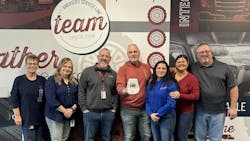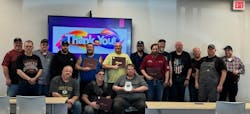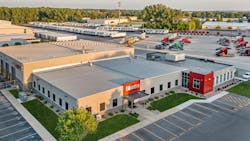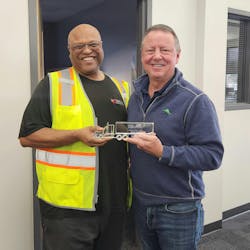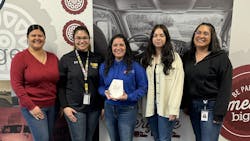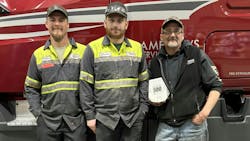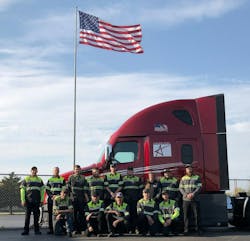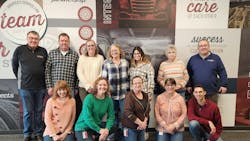Steakhouse menus and backyard grills could be much sparser without the people behind America’s Service Line, the private fleet for American Foods Group, one of the U.S.’s largest beef processors. Building a good work culture, recruiting and retaining the best drivers, and balancing trucking industry challenges are among the reasons the fleet has continued to thrive this century.
“We try to be the best private fleet that we can be and the best trucking company that we can be,” Scott Willert, ASL’s president, told FleetOwner. “Our owner told me once that he really appreciates that I treat this like a trucking company. It goes without saying that we greatly value our employees, but we also value this as a business and look to do as well as we can to provide return for our internal and external stakeholders.”
America’s Service Line facts & figures
America’s Service Line is the private fleet for America’s Food Group, a privately held, family-run company with a history dating back more than 70 years. AFG is the fifth largest beef processor in the U.S., with plants throughout the Midwest.
Headquarters: Green Bay, Wisconsin
Founded: 1996
Tractors: 250
Refrigerated trailers: 400
Company drivers: 250
Contracted drivers: 75
Willert and his team at ASL are the 2024 FleetOwner Private Fleet of the Year. This magazine recognized them during an award ceremony at the National Private Truck Council’s annual conference in Orlando in late April.
Based in Green Bay, Wisconsin, America’s Service Line’s 200 company drivers and 75 owner-operators are responsible for nearly half of American Food Group’s shipments. The rest are managed through longtime carrier partners. Founded to support AFG in 1996, ASL has grown its fleet to 200 tractors and 350 refrigerated trailers.
Along with being one of the nation’s five largest beef processors, AFG supplies pork and sausage to grocers and other food service retailers. Its brands include Big City Reds, Great American Brands, Sheboygan Sausage, and Skylark Meats.
“It’s an outstanding company to work for,” Willert said of ASL and AFG parent company Rosen’s Diversified Inc. “I greatly appreciate the authority and autonomy that they give to me to build such an outstanding team and do great things for our people. It’s a lot of fun.”
See also: 2024 FleetOwner 500: Private, the largest corporate transportation operations in the U.S.
Building the right transportation team
Community outreach and recognition
- ASL is active in the Green Bay Chamber of Commerce and is part of its Transportation and Logistics Task Force.
- President Scott Willert is a member of the Green Bay Economic Development Board
- ASL was recognized in 2023 as the Next Generation Best Place to Work in the Greater Green Bay area.
- The company is part of its community’s Adopt a Block program, and many team members volunteer to help keep the city clean in their spare time.
- ASL raises money to support local homeless shelters, and company volunteers serve multiple meals there.
- Each October, the fleet raises money to support cancer research.
- ASL also supports Habitat for Humanity.
“I can replace a truck,” noted David Giese, ASL’s fleet maintenance director. “Unfortunately, we’ve had to replace drivers—they’re one of the hardest to find in the industry.”
One of Willert's leadership cornerstones is building the right team to move protein out of the American Heartland to butchers and grocers nationwide.
“We’ve done our best to create a culture where people enjoy coming to work every day and look forward to it,” he said. “They take great pride that we don’t just hire anyone. We want good people. We want solid professional drivers who know how to build and enhance relationships, serve customers well, and work well with each other.”
A former Kraft Foods fleet executive, Willert has been in the private fleet industry for 25 years, the last nine with ASL. He said one key to success is getting to know his employees and allowing them to get to know him. And he’s centered his company’s culture around listening.
“When I went to work, I had one-on-ones with every one of our employees to understand where they were in their careers, what they wanted, what their challenges were,” Willert recalled.
See also: Private fleet's emphasis on good equipment and drivers drives success
“Enhancing the culture, that was the easy part. The hard part is going forward,” he said. “You can’t be complacent. What people want today is going to be different than what they want or need five years from now. So you have to stay on top of that—you can’t stay rooted in ‘this is how I’m going to do things for the rest of my career.’ Any business that has employees, for the most part, is about people. Getting the most from your people, appreciating them, recognizing them, educating them on goals and how you’re doing along the way is extremely important for you to be successful.”
Giese echoed the importance of adapting to the times. “Our viewpoint of what we used to do 20 years ago is much different than now,” he explained. “We have to cater to drivers, whereas everybody back then used to think drivers were a dime a dozen. But we’re catering to them now. We’re making the equipment much more plush for them.”
Always exploring new opportunities
Catering more to America’s Service Line drivers, whose average pay outpaces industry benchmarks, has helped the fleet gain buy-in and get more out of its employees and equipment.
“Everybody in this building—all our mechanics, our city drivers, and our road drivers—all feel the same way: Let’s keep striving to get better.”
- David Giese, America’s Service Line fleet maintenance director
Giese’s team focuses on helping those drivers get the most out of fleet equipment by seeking better efficiency and driver experiences.
“You have to keep trying,” Giese told FleetOwner. “It’s an old adage, but it’s true: If you just keep doing the same thing all the time and never change, you end up being the guy standing in the corner with a paintbrush in your hand looking at the floor asking, ‘What idiot did that?’”
With an emphasis on driver safety, ASL uses modern fleet technology such as telematics, cameras, and collision avoidance systems.
“We incentivize drivers to operate safely while helping us keep our costs down and provide outstanding service to our customers,” Willert said. “We're EPA SmartWay certified and have been for years. We're constantly evaluating and testing new technology to improve fuel economy, driver satisfaction, and safety.”
Giese said that Willert allows him to try out new things within the fleet while still focusing on the practicality of innovations. His team uses data to evaluate how new technologies and strategies are working, tracking metrics on tires, fuel economy, and driver feedback to make informed decisions on innovations.
The company’s fleet of Freightliner and Kenworth trucks is spec’d with Rolltek seats for drivers and side skirts on all trailers. ASL also ties driver bonuses to efficiency technologies and practices, such as cruise control and idling. The fleet now regularly averages better than 8 mpg, and its idle time is less than 4%.
ASL had been testing two hybrid-converted tractors, but the startup company that developed the technology recently folded, so the vehicles were converted back to traditional diesels.
Giese acknowledged that only some experiments will be successful. Still, he sees failure as an opportunity to learn and refine ASL’s transportation approach, prioritizing impactful solutions for its operations and bottom line.
“I have no limits on what I can do here,” Giese said. “All I have to do is explain to Scott why.”
Finding the right fits for the fleet
When ASL first started its transportation system in the mid-1990s, it focused on refrigerated trailers operated by owner-operators. However, in 2008, ASL began acquiring tractors and hiring drivers. ASL heavily relies on referrals for new employees, particularly drivers. Willert said more than half of new hires come from driver referrals.
“They all take a lot of pride in that we don't just hire anyone,” he explained. “We want good people. We want solid professional drivers who know how to build and enhance relationships and serve customers and work well with each other."
To keep those drivers connected to America’s Service Line culture while on the road, Willert and his management offer Luma online training and broadcast quarterly meetings to over-the-road drivers over the web.
"We do our very best to stay as connected as we can to people to give them good solid communication and be good listeners," he noted.
Along with focusing on its people, ASL considers itself customer-centric. Both Willert and Giese emphasized the importance of understanding and exceeding customer needs. Those customers aren’t just the businesses that rely on AFG’s protein. Willert said his fleet has worked hard to reduce empty miles with backhauls, which has helped improve its financial success.
Since the fleets’ trailers are reefers, ASL has the flexibility to pick up temperature-sensitive freight or general goods on its backhauls.
“Why wouldn’t you want to reduce empty miles?” he noted. “Why wouldn’t you want to get as much revenue as you can to offset your costs and be on the positive side of the equation?”
He said an essential part of building this successful private fleet team is transparency about how backhauls, technology, and other business decisions contribute to the fleet’s financial success. Willert believes in involving employees in decisions, which fosters a sense of ownership and collaboration. He stressed the importance of fleet leaders maintaining and growing positive work environments as employee needs and expectations evolve.
“Everybody in this building—all our mechanics, our city drivers, and our road drivers—all feel the same way: Let’s keep striving to get better,” Giese said. “We are a small enough company that when you walk in my door as a driver, you’re not just a driver. You’re an employee of ASL—no different than I am. My door’s always open to my drivers. So is Scott’s. So is Greg [Gmeinder’s], who runs operations, our safety team, and even our accounting department. They’re always open to talk to drivers. Because they’re all part of this business.”
About the Author
Josh Fisher
Editor-in-Chief
Editor-in-Chief Josh Fisher has been with FleetOwner since 2017. He covers everything from modern fleet management to operational efficiency, artificial intelligence, autonomous trucking, alternative fuels and powertrains, regulations, and emerging transportation technology. Based in Maryland, he writes the Lane Shift Ahead column about the changing North American transportation landscape.
